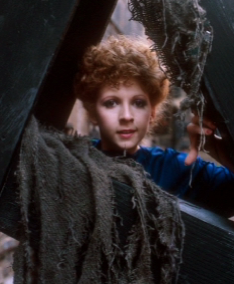Was Bonnie Langford the worst Doctor Who assistant ever? Or did she have hidden depths that were ignored because of prejudice and preconceptions, ponders Steve O’Brien?


Prosecution: This week, we feel especially sorry for you on the defence team. How can you possibly defend the indefensible? It’s like being Rudolph Hess’s lawyer at Nuremburg! Good luck! (sniggers).
Defence: Innocent until proven guilty, remember. And we’re sure that Melanie Bush, the computer programmer fitness freak companion of the sixth and seventh Doctors as played by Bonnie Langford, will be not only proven innocent, but will finally be recognised as a truly great Doctor Who companion.
Prosecution: In your dreams. Okay, let’s take the casting first. Bonnie Langford... We would ask, who on Earth thought up this ridiculous piece of stunt casting? But we already know the answer – John Nathan-Turner. As producer during the 1980s – surely the creative nadir of the show – he was crazed on casting light entertainment names for parts they were clearly not suited for (Ken Dodd, Chloe Ashcroft, Nicholas Parsons). And Bonnie Langford as Melanie Bush tops that list of casting mistakes.
Defence: Getting Doctor Who in the newspapers and getting Doctor Who talked about was JNT’s greatest strength. But it was hardly ever at the detriment of the show (Beryl Reid in “Earthshock” being an embarrassing exception; on the other hand Nicholas Parsons was a revelation in “The Curse Of Fenric”). Bonnie Langford was a big name in the mid-’80s, but he wasn’t casting the Bonnie Langford of 1976. That precocious brat would have been unbearable. But he WAS casting a 22 year-old acting veteran who brought with her energy, charisma and a family-friendly brand.
Prosecution: ...But no acting talent. Come on, Bonnie Langford was many things in the 1980s, but known for her acting chops she was not.
Defence: She may have become famous after winning Opportunity Knocks , but that ignores the fact that Bonnie Langford had acting roles in Just William , Bugsy Malone and Wombling Free amongst other things, and had a full entertainment grounding at the Italia Conti Academy stage school, so she hardly came to the part unprepared!
Sign up to the SFX Newsletter
Get sneak previews, exclusive competitions and details of special events each month!
Prosecution: Okay, okay, but the Italia Conti Academy stage school? Come on, we’re hardly talking The Actor’s Studio, are we? And despite all that sterling acting work, it’s Royal Variety Shows that we all knew her from. But anyway, what of the insanity of casting Bonnie Langford as a computer programmer? We get the fitness bit, but do we really buy Bonnie as a prototype Bill Gates?
Defence: So all computer programmers have to look ugly and dowdy? Grow up.
Prosecution: But it’s not as if we ever got to see any of this amazing software talent. She was an amazingly bad written character – as one would expect given that she was birthed by Pip and Jane Baker, by common consent, two of the worst writers ever to work on Doctor Who .
Defence: By modern standards, Mel is underwritten and little more than a hastily scribbled-out list of background details. But in the hands of an actress without the effervescence of Bonnie Langford, the character might have sunk. Langford makes Mel sparkle. And her character wasn’t helped by not having a proper introduction story. Because her first story, “Terror of the Vervoids”, took place after she’d first met the Doctor, we didn’t have the usual getting-to-know-you dance that an introductory story offers a character. So all this computer programmer from Pease Pottage stuff just floats in her resume without us knowing anything about it.
Prosecution: But what of her first scene? How irritating was that? We’re introduced to her forcing carrot juice down the Doctor’s throat and putting him through a punishing session on the fitness bike.
Defence: Are you suggesting the sixth Doctor DIDN’T need a bit of calorie burning?
Prosecution: A bit undignified though?
Defence: Nonsense. She may have also been a screamer, but it shows that Mel wasn’t a Jo Grant type companion, willing to be bossed around and meekly doing what they’re told. Anyway, it’s not as if this fitness bullying continued beyond her first story.
Prosecution: But wasn’t the ridiculousness of Langford’s over-perky persona highlighted in “Time & The Rani”, by Kate O’Mara’s wickedly perfect impersonation of Mel? Surely a show shouldn’t be taking the piss out of one of its regular characters only a few episode after she’s been introduced?
Defence: But it’s brilliantly funny. The only real tragedy about that is that the scriptwriters (the ever-unreliable Pip and Jane Baker again) weren’t savvy enough to include a scene between Mel and the Rani-As-Mel. A lost opportunity...
Prosecution: But Mel hardly advanced the role of the companion, did she? She was hardly a strident, independent woman after that initial burst of dominance in her opening scene. She screamed, on average, probably more than any other companion it seems. This was 1987, when Star Trek: The Next Generation was making a woman its security chief!
Defence: You’re complaining that she’s a Doctor Who companion in the classic Doctor Who companion mould? Yes, she was a screamer, but boy, could she do it well!
Prosecution: And what about her exit? Going off with Sabalom Glitz to explore the galaxy? As unlikely and abrupt an exit as we’ve ever seen! When did they decide that one? While they were filming the scene??
Defence: Granted, as a farewell, it’s difficult to buy. But that was the haphazard script-editing of the time. No, as a companion, Mel was warm and bubbly and – most importantly – KIDS LIKED HER. Ten year-olds in 1986 weren’t complaining about Bonnie Langford’s casting. As usual with Doctor Who , its fans forget who their programme’s target audience really is. Give the girl more than a break and give Mel Bush another chance!
Prosecution: That sounds suspiciously like George Lucas’s defence of Jar Jar Binks.
SFX Magazine is the world's number one sci-fi, fantasy, and horror magazine published by Future PLC. Established in 1995, SFX Magazine prides itself on writing for its fans, welcoming geeks, collectors, and aficionados into its readership for over 25 years. Covering films, TV shows, books, comics, games, merch, and more, SFX Magazine is published every month. If you love it, chances are we do too and you'll find it in SFX.


